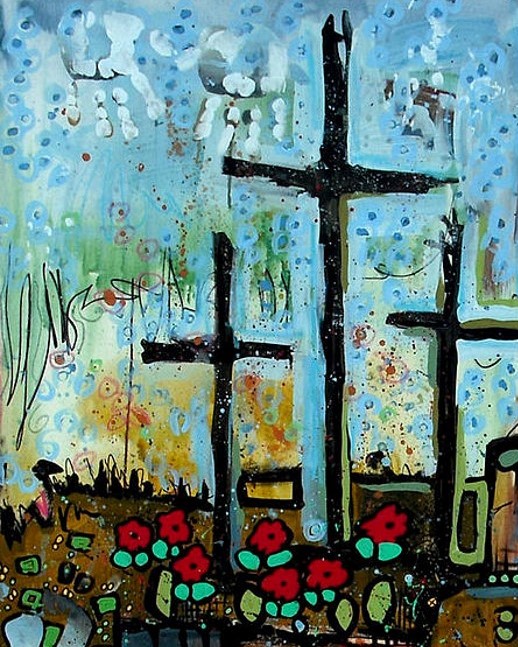
Re-Member Me
(Sermon Series: The Nameless in the Gospels 1/6)
There are many stories in the Gospels that include people who are never named. For six weeks we'll be delving deeper into a few of these characters (excluding the parables) to see how they might speak to us.
Since we’re so close to Easter, let’s think about the two thieves who hung on crosses on either side of Jesus. First of all, we need to understand that these are not thieves in the sense we think of them. People were not killed for stealing from the shopkeeper or the rich man down the street. The Greek word that has been translated as “bandits” or “robbers or “thieves” or “criminals," was often used to describe the guerilla fighters against Rome. Depending on your viewpoint, you could consider them terrorists or freedom fighters**. In any case, it is clear that all three, Jesus and the two criminals, were being crucified as rebels against Rome.
I’d also note that, while the two criminals are noted in all four gospels, only Luke includes this interesting conversation between the three of them (Luke 23:32-43). Since Luke was written third of the gospels and long after Paul's letters, we must ask ourselves, what was Luke's intention in developing this conversation? What meaning was he trying to convey? Why was it important?
Certainly, we can only guess at the answer to these questions, but in doing so, we find richness in the process and possibilities. Perhaps the thieves were like the proverbial angel and devil on our shoulders, one wanting taunting Jesus and the other taking his side. It's also somewhat reminiscent of Jesus' time in the wilderness where Satan tempts him to use special powers.
Or maybe this conversation is another opportunity for us to see the unconditional love Jesus had for all people. Afterall, Luke has Jesus forgive those who are crucifying him “for they know not what they do.” (Note that this also only takes place in Luke.) And then, Jesus assures the rebel that “today you will be with me in paradise.” Despite the fact that the creeds say that Jesus descended into hell before he rose again, Luke firmly believes that Jesus will be in paradise, and that paradise will include people that most didn’t think would be there.
The Jesus that Luke relates to us throughout his gospel is a man who breaks the social barriers of who is in and who is out. He is a man of inclusion and forgiveness. Jesus operated at a higher level of consciousness, a level of love, not condemnation. And, even though he gets frustrated with those who reject his message, who don’t understand, and who prefer to preserve the status quo and their important positions within it, he offers forgiveness at the end. The line – “Abba, forgive them, they don’t know what they are doing” isn’t directly addressed to any one person, so perhaps it applies to all who have brought about his execution. In this line of thinking, perhaps Jesus is speaking to both of the men who hang next to him when he says, “Today you’ll be with me in paradise.”
There are two points I want to make. First, you know that I don’t believe in heaven and hell. I’m convinced they are human constructs. While we are here on this earth for a finite time, I believe our souls, our energetic selves, the part of us that is light and love, are part of infinite or eternal time. And that goes for everyone.
We’ve all experienced religion judging and blaming and condemning. We’ve all been at a funeral where either the person who died was consigned to hell, or everyone in the audience who wasn’t a Christian was consigned to hell. Some of us have experienced families arguing over someone’s faith as they lay dying. All this does is cause more hurt and pain, it doesn’t help anyone to heal and certainly does not follow the forgiving, loving Jesus portrayed here. Jesus certainly doesn't require the thieves to confess him as their "Lord and Savior" before assuring them they'd be in paradise with him.
How would it change the way we live and interact if we truly believed in this level of benevolence?
So, here is the second thing I want to say, the man hanging next to Jesus says “remember me when you come into your glory.” Perhaps “remember” is the word we need to think about.
If something has been dismembered it has been taken apart. If you re-member something you are putting it back together again. Jesus came for the lost, the hurting, the outcast, the broken, the marginalized, and truly we all have parts of us that are dismembered, that are broken or have been torn apart. His goal was to re-member people, to put them back together again in whatever way they needed.
This may be a stretch, but it seems to me that in asking to be remembered, the man on the cross was also asking to be re-membered, made whole, put back together again.
It’s time we worked a bit harder to follow Jesus’ example, to love those who can be difficult to love, to seek to re-member ourselves and those around us through forgiveness, through seeking wholeness and healing, through acceptance.
John Shelby Spong once wrote, “I... assert that making it possible for everyone else to live, to love, and to be is the only mission that Christian people possess. Our task is not to convert; our task is to call people into the depths of their own capacity to be.”
Love & Light!
Kaye



